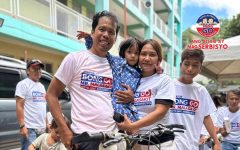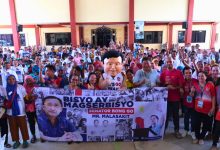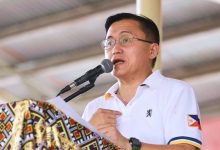SENATOR Christopher “Bong” Go has expressed his support for the Contact Center Services National Certificate (NC II) program graduates in Argao, Cebu, as his Malasakit Team extended additional assistance to them on Friday, February 2.
This initiative, a collaboration between the Technical Education and Skills Development Authority (TESDA) and Call Center Academy, aims to equip individuals with the necessary skills and qualifications to thrive in the competitive call center industry.
At the municipal training hall, 75 graduates received grocery packs, snacks, shirts, and balls for basketball and volleyball from Go’s Malasakit Team.
In a message, Senator Go underscored the critical importance of such training programs. He pointed out that the Contact Center Services NC II program plays a pivotal role in ensuring that Filipinos are well-prepared to meet the demands of the global business process outsourcing (BPO) sector.
“This program is essential for providing our youth with the right tools and knowledge to succeed in the call center industry,” Go remarked. He further emphasized that equipping individuals with such specialized training enhances their employment prospects and contributes significantly to the country’s economic development.
The Contact Center Services NC II program by TESDA is designed to cover all the fundamental aspects of working in a call center environment. The curriculum is aligned with international standards, from customer service and handling inquiries to managing complaints and utilizing information technology tools. The program also includes modules on enhancing communication skills, a critical component for any call center professional.
Meanwhile, Go underlined the importance of Technical and Vocational Education and Training (TVET) to the country’s advancement. He emphasized that TVET aims to bridge the skills gap by guaranteeing that Filipinos from all socioeconomic backgrounds can obtain essential and in-demand skills. As a result, they could contribute significantly to the nation’s economic growth and find fulfilling employment.
The senator also filed Senate Bill No. (SBN) 2115 to institutionalize TVET and livelihood programs for rehabilitated drug dependents. The bill seeks to provide skills training and enhance the employability of former drug dependents, allowing them to rebuild their lives and contribute to their communities.
As head of the Senate Committee on Health and Demography, Go highlighted that government medical assistance programs are available at any of the seven Malasakit Centers within the province.
Republic Act No. 11463, or the Malasakit Centers Act, was enacted into law in 2019 and was principally authored and sponsored by Go. It brings together representatives from concerned agencies from the Department of Social Welfare and Development, the Department of Health (DOH), the Philippine Health Insurance Corporation, and the Philippine Charity Sweepstakes Office to help indigent patients reduce their hospital costs to the least possible.
In Cebu City, Malasakit Centers are located at Vicente Sotto Memorial Medical Center (VSMMC), St. Anthony Mother and Child Hospital, and Cebu City Medical Center. Meanwhile, there are other Malasakit Centers at Cebu Provincial Hospital in Carcar City, Lapu-Lapu City District Hospital, Eversley Childs Sanitarium and General Hospital in Mandaue City, and Talisay District Hospital in Talisay City.
According to DOH, there are now 159 Malasakit Centers nationwide, which have assisted around ten million Filipinos.
Furthermore, Go shared he continues to push for establishing Super Health Centers nationwide. Through the collective efforts of the DOH led by Secretary Teodoro Herbosa, local government units (LGUs), and fellow lawmakers, sufficient funds have been allocated under the DOH for the construction of 307 Super Health Centers in 2022, 322 in 2023, and 132 in 2024.
As the lead implementing agency, DOH identifies the strategic locations where such centers shall be established, 21 of which are funded in the province of Cebu.
Go also highlighted RA 11959, known as the Regional Specialty Centers Act, which he principally sponsored and was one of the authors in the Senate. This legislation holds significant importance in the healthcare legislative agenda of the Marcos Administration, as outlined in the Philippine Development Plan spanning 2023 to 2028. The law is designed to establish Regional Specialty Centers within existing regional hospitals under the oversight of DOH.
Currently, there are three Regional Specialty Centers inside VSMMC, including cardiovascular care, neonatal care, and trauma care. There will be other specialty centers set to be established inside the hospital, such as renal care and transplant center, lung care, brain and spine care, orthopedic center, physical rehabilitation medicine, infectious disease and tropical medicine, mental health, burn care, toxicology, cancer care, geriatric care, eye care, and dermatology care.
Highlighting the importance of infrastructure development in stimulating economic recovery and promoting sustainable growth, Go, as the vice chairperson of the Senate Committee on Finance, also supported numerous projects in the province.
These include the construction of multipurpose buildings in Barili, Cordova, Ginatilan, Pilar, Tabogon and Talisay City; improvement of existing roads in Alcantara, Alcoy, Alegria, Asturias, Balamban, Boljoon, Borbon, Carmen, Madrilejos, Malabuyoc, Minglanilla, Moalboal, Pinamungajan, Sibonga, Sogod, Tabogon, Tabuelan, Carcar City and Naga City; improvement of flood mitigation structures in Catmon and Tuburan; installation of street lights in Asturias, Compostela and Daanbantayan; and acquisition of ambulance units for Madridejos and Naga City.
On January 21 and 14, Go personally participated in the Sinulog festivities in Cebu City, where he also aided fire victims.




